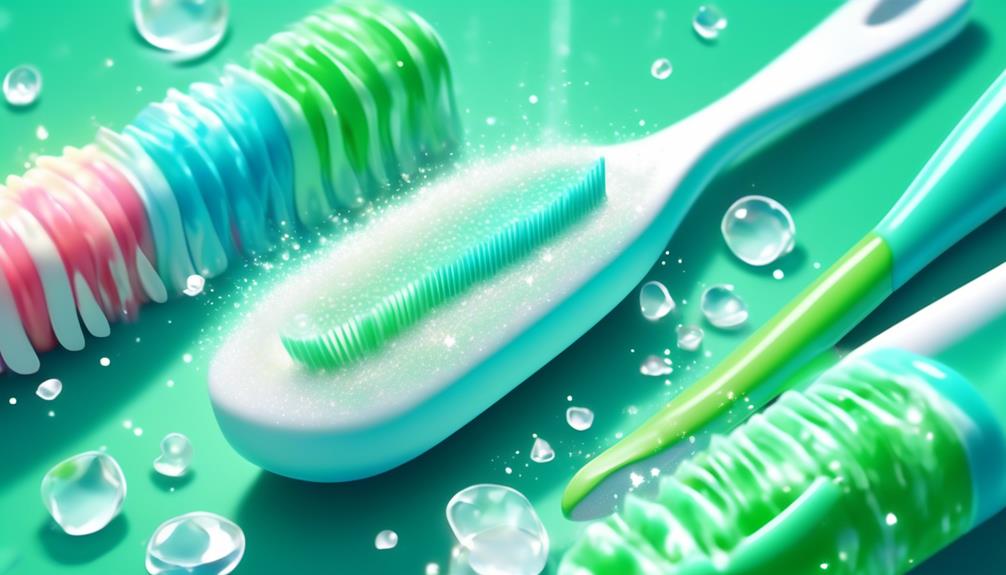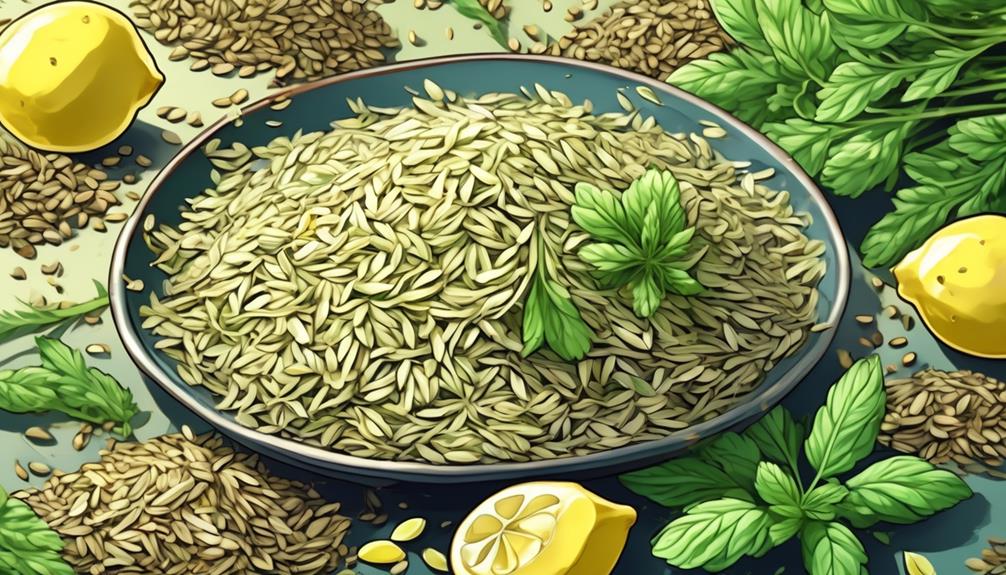Are you tired of feeling self-conscious about your bad breath? Rest assured, there are natural remedies that can help you achieve fresh breath without relying on artificial products.
You might be thinking, ‘But do these remedies really work?’ Well, let me tell you, they have been tried and tested by many and have proven to be effective.
So, if you’re ready to discover these simple yet powerful solutions, keep reading because you’re about to uncover the secrets to banishing bad breath naturally and gaining the confidence you deserve.
Fresh Breath
- Incorporating fresh parsley into meals or chewing it after meals can help neutralize mouth odors and reduce bacteria growth.
- Drinking pineapple juice after meals or swishing it in the mouth can neutralize odor-causing compounds, reduce bacteria levels, and promote the growth of healthy bacteria in the mouth.
- Staying hydrated by drinking water not only washes away food particles but also dilutes acidic foods and drinks, defends against acids and tooth decay with fluoride, and stimulates saliva production.
- Consuming plain, nonfat yogurt or milk daily can introduce beneficial bacteria, inhibit the growth of bad bacteria, promote saliva production, and help wash away food particles and bacteria.
Good Dental Hygiene

Good dental hygiene is crucial in preventing bad breath and maintaining optimal oral health. By practicing proper dental hygiene, you can reduce bad breath and keep your mouth healthy.
One of the key steps in good dental hygiene is brushing your teeth at least twice a day with fluoride toothpaste.
Brushing helps to remove plaque and food particles from your teeth, preventing the buildup of bacteria that can cause bad breath. Don’t forget to brush your tongue as well, as it can harbor bacteria that contribute to unpleasant odors.
In addition to brushing, flossing is essential for removing plaque and food particles from between your teeth. This helps to prevent the growth of bacteria and reduces the risk of bad breath.
Along with regular brushing and flossing, rinsing your mouth with water after meals can help to wash away food particles and bacteria.
Saliva also plays a crucial role in maintaining fresh breath. Chewing sugar-free gum can stimulate saliva production, which helps to clean the mouth and freshen breath.
Finally, using mouthwash with antibacterial properties can help eliminate bad breath by killing bacteria in the mouth.
Parsley for Fresh Breath

Incorporating parsley into your daily routine can be a natural and effective way to combat bad breath. Parsley has a deodorizing effect on bad breath and chewing fresh parsley can help neutralize unpleasant odors in the mouth.
This herb is believed to help freshen breath naturally by improving oral hygiene.
One of the causes of bad breath is the presence of bacteria in the mouth. Parsley contains natural compounds that can help reduce the growth of bacteria, thereby addressing the root cause of bad breath.
By incorporating parsley into your diet, you can contribute to improved oral hygiene and combat the effects of certain foods that cause bad breath.
Parsley can be easily included in your meals or consumed as a standalone remedy.
Chewing a few sprigs of fresh parsley after meals can help freshen breath and promote saliva production. Saliva plays an important role in maintaining oral health as it helps wash away bacteria and food particles that can contribute to bad breath.
To further enhance the effectiveness of parsley in combating bad breath, you can also try combining it with other home remedies such as apple cider vinegar, tea tree oil, or clove oil. These natural ingredients have antibacterial properties and can provide additional freshening benefits.
‘Did you know? Parsley isn’t only beneficial for freshening breath, but it’s also a good source of vitamins A and C, as well as iron and antioxidants. So, adding parsley to your meals not only helps combat bad breath but also provides nutritional benefits.’
Pineapple Juice for Fresh Breath

Let’s now explore the effectiveness of incorporating pineapple juice into your daily routine.
Pineapple juice is believed to be an effective treatment for bad breath, and it can be a natural and tasty way to freshen your breath instantly.
The enzymes present in pineapple juice may help neutralize odor-causing compounds in the mouth, making it a great addition to your arsenal of remedies for bad breath.
Including pineapple juice in your diet can contribute to improved oral hygiene and fresher breath. The enzymes in pineapple juice work by breaking down the bacteria in various parts of your mouth, including the tongue and gums, where bad breath often originates. By reducing the levels of bacteria in these areas, pineapple juice helps tackle bad breath at its source.
Moreover, pineapple juice promotes the growth of healthy bacteria in the mouth.
These good bacteria play a crucial role in maintaining oral health and fighting off harmful bacteria that can cause bad breath. By incorporating pineapple juice into your daily routine, you can support the natural balance of bacteria in your mouth and keep bad breath at bay.
To make the most of pineapple juice as a home remedy for bad breath, consider drinking a glass of it after meals or swishing it around your mouth for a few seconds before spitting it out.
Remember to brush your teeth and tongue regularly, use warm salt water rinses, and consider incorporating other natural remedies like tea tree oil to keep your mouth clean and fight off bacteria. With these simple steps, you can enjoy fresh breath and improved oral hygiene.
‘Did you know? Pineapples contain an enzyme called bromelain, which has anti-inflammatory properties and can help reduce swelling and inflammation in the body? So not only can pineapple juice help with bad breath, but it also offers other potential health benefits. So go ahead and indulge in some delicious pineapple juice to keep your breath fresh and your body healthy!’
Water for Dental Hygiene

Drinking water is an essential step in maintaining a healthier mouth and preventing bad breath. Here are some reasons why water can help freshen your breath and promote oral hygiene:
- Water washes away food particles: Drinking water helps wash away food particles that can get stuck in between your teeth and gums. By rinsing your mouth with water after meals, you can prevent the buildup of bacteria that can cause bad breath.
- Dilutes acid in the mouth: Acidic foods and drinks can contribute to bad breath. Water helps dilute these acids, protecting your tooth enamel and reducing the chances of developing bad breath.
- Fluoride defends against acids: Many water sources contain fluoride, which helps defend against acids and can even reverse early stages of tooth decay. This not only promotes a healthier mouth but also helps maintain fresh breath.
- Increases saliva production: Staying hydrated by drinking water can stimulate saliva production. Saliva helps to naturally cleanse the mouth, neutralize acids, and prevent dryness, all of which can contribute to bad breath.
- Cleanses dental appliances: Water is an effective and natural way to rinse and clean dental appliances such as retainers or dentures. By regularly cleaning these devices with water, you can reduce bacterial growth and keep your breath fresh.
Incorporating water into your daily routine by drinking it regularly, rinsing your mouth after meals, and using it to clean dental appliances can help maintain a healthier mouth and freshen your breath.
You might also like to make your own DIY detox water for a refreshing and revitalizing drink. It’s easy to make, will leave you feeling rejuvenated and help keep your breath fresh throughout the day.
‘Did you know? Water is the primary component of saliva, which is essential for oral health. Saliva helps to break down food particles, neutralize acids, and fight off bacteria, keeping your mouth fresh and healthy.’
Yogurt for Fresh Breath

Water isn’t the only natural remedy for bad breath; another effective option is incorporating yogurt into your daily diet.
Yogurt contains lactobacillus, a beneficial bacteria that combats the bad bacteria in your mouth. Consuming plain, nonfat yogurt daily can help fight bad breath and contribute to overall oral health.
One of the causes of bad breath is the buildup of bad bacteria in the mouth. Yogurt helps to counteract this by introducing lactobacillus into your oral microbiome. This beneficial bacteria works by inhibiting the growth of bad bacteria, ultimately leading to fresher breath.
In addition to its ability to combat bad bacteria, yogurt also promotes saliva production. Saliva plays a crucial role in maintaining oral hygiene as it helps to wash away food particles and bacteria that can cause bad breath. By increasing saliva production, yogurt helps to naturally freshen your breath.
Incorporating yogurt into your daily diet is a simple and enjoyable way to improve your oral health and combat bad breath. Consider adding a serving of plain, nonfat yogurt to your breakfast or as a healthy snack throughout the day.
Alongside regular brushing and flossing, yogurt can be a tasty and beneficial natural remedy for halitosis (bad breath).
Milk for Fresh Breath

Incorporating milk into your daily diet can significantly improve bad breath caused by garlic or other odorous foods. Here are some reasons why milk can help freshen your breath:
- Milk contains lactose, a natural sugar that helps combat bad breath-causing bacteria. When these bacteria break down food particles in your mouth, they release foul-smelling compounds that contribute to bad breath. Lactose helps neutralize these compounds, reducing their odor.
- Drinking milk can increase saliva production. Saliva plays a crucial role in maintaining oral health as it helps wash away food particles and bacteria. By increasing saliva production, milk helps keep your mouth clean and fresh.
- Milk contains lactobacillus, a beneficial bacteria that can help balance the oral microbiome. A healthy oral microbiome is essential for preventing bad breath.
- Regular consumption of milk promotes overall oral and general health. It provides essential nutrients like calcium, which strengthens teeth and bones, reducing the risk of dental issues that can contribute to bad breath.
- Milk is a versatile ingredient that can be used in various home remedies to freshen breath. For example, you can mix milk with baking soda and use it as a mouthwash to neutralize odors.
Incorporating milk into your daily routine can be a simple and effective way to combat bad breath naturally. So, why not make milk a part of your regular diet and enjoy its freshening benefits?
Fennel or Anise Seeds

Chewing on fennel or anise seeds is an effective way to combat bad breath naturally due to their natural properties and benefits. Both fennel and anise seeds contain essential oils that have antimicrobial properties, which can help kill the bacteria responsible for causing bad breath.
Firstly, the essential oils found in fennel and anise seeds have been shown to have antibacterial properties. These oils, such as anethole in anise seeds and estragole in fennel seeds, have been found to inhibit the growth of bacteria that contribute to bad breath, such as Streptococcus mutans and Porphyromonas gingivalis. By chewing on these seeds, the essential oils are released and come into contact with the oral cavity, helping to kill the bacteria and freshen breath.
Additionally, fennel and anise seeds have a natural aromatic fragrance that can help mask unpleasant odors.
The seeds have a pleasant, sweet taste and a refreshing aroma that can help neutralize bad breath temporarily. By chewing on these seeds, the aromatic compounds are released and can help mask the odor-causing compounds in the mouth, providing a fresh feeling.
Fennel and anise seeds are also known for their digestive properties.
They can help stimulate saliva production, which is essential for maintaining oral health. Saliva helps to wash away food particles and bacteria in the mouth, preventing the buildup of plaque and reducing the chances of bad breath. The act of chewing on these seeds can also help promote healthy digestion, which can indirectly contribute to fresher breath.
It is important to note that while chewing on fennel or anise seeds can offer temporary relief from bad breath, it is not a substitute for good oral hygiene practices.
Regular brushing, flossing, and tongue cleaning, along with regular dental check-ups, are still crucial for maintaining optimal oral health and preventing bad breath in the long term.
Orange for Fresh Breath

Oranges, with their high vitamin C content and dental hygiene benefits, are a natural remedy to combat bad breath and promote overall oral health. Here are some reasons why incorporating oranges into your diet can contribute to fresher breath and improved oral hygiene:
- Promote saliva production: Chewing on oranges stimulates saliva production, which helps wash away bacteria and food particles that can cause bad breath.
- Vitamin C benefits: Oranges contain vitamin C, which is essential for healthy gums and maintaining oral hygiene. It helps prevent gum disease and strengthens the connective tissues in your mouth.
- Freshen breath: The natural citrus oils found in oranges can help freshen your breath, leaving you feeling confident and revitalized.
- Oral hygiene boost: Oranges can be a great addition to your oral hygiene routine. Their natural acidity helps break down plaque on the teeth, reducing the risk of cavities and gum disease.
- Convenient and accessible: Oranges are readily available and easy to incorporate into your daily routine. Whether you enjoy them as a snack or add them to your meals, they offer a convenient way to freshen your breath naturally.
Better Oral Health
Maintaining good dental hygiene and incorporating natural remedies can help you achieve fresh breath. By regularly brushing your teeth, flossing, and scraping your tongue, you can eliminate bacteria that cause bad breath.
Chewing on parsley or cloves, drinking pineapple juice or water, consuming yogurt, oranges and using tea tree oil can also freshen your breath. Additionally, avoiding tobacco products and alcohol, staying hydrated, and maintaining a healthy diet contribute to long-lasting fresh breath.

